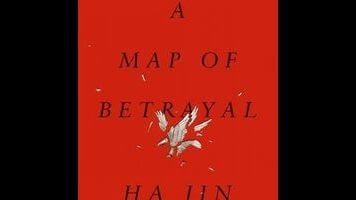
Novels can be acts of self-interrogation, with writers using the fictional space to plumb questions of their own identities. (In fact, some critics argue that every novel is such an act.) It’s hard not to see Ha Jin’s latest book, A Map Of Betrayal, in this light. The two-time PEN/Faulkner-winning author has created a novel that’s also a primer on modern China, seen through the perspective of Chinese immigrants living in the United States. Jin himself was born and raised in China, though he’s made a home for himself in America for the last 30 years. As his characters compare the two countries and forcefully argue for their respective cultures, a reader can’t help but think these are debates Jin has had himself, the same doubts, fears, and hopes passing through his own thoughts.
Based on the true story of Chinese spy Larry Chin, A Map Of Betrayal follows Gary Shang as he infiltrates the American government, initially as a translator for the Nationalists during the Chinese civil war. Gary’s daughter, Lilian, finds his old journals long after her father’s death and begins to piece together his past. Finding that her father had a wife and children in mainland China before his life as a spy, she tracks them down, reconstructing their lives and history as well. As Lilian digs deeper into her father’s past, she confronts questions of his identity as well as her own.
Although A Map Of Betrayal is ostensibly about a spy, there’s little of the cloak-and-dagger antics readers would find in a John Le Carré or Robert Ludlum novel. Instead, Jin shows how Gary quickly acclimates and buys into American life, from enjoying European breads to crying when JFK is assassinated. It’s perhaps the normalcy of his everyday life that makes Gary so ambivalent toward his espionage, eventually believing that he is working behind the scenes to bring China and the United States closer together. That ambivalence is embodied in Lilian, who wrongly believes herself beyond her father’s struggles of identity.
At times, Lilian gives the impression of being a mouthpiece. She’s critical of her Chinese family’s devotion to their home country, and as a professor of Asian studies, she interacts critically with her heritage. On a number of occasions, especially when arguing with her father’s only grandson, she strikes positions that are a bit too on the nose (“Why is a country always innocent and always right?” she says late in the book, “Hasn’t your country betrayed you?”). A cursory reading of the text might make her out to be anti-Chinese (an accusation that has been made about Jin as well).
But to write Lilian off this way is to mistake what Jin is really up to. Yes, on the face of it she is tied to a very distinct and critical point of view, in which fealty to the past brings only destruction (as it did in her father’s case). Nonetheless, Lilian goes distinctly out of her way to suss out her father’s past, and is herself a historian. No matter how critical an eye she points toward her father’s homeland, she is clearly pulled by it, unable to make as sharp a break from her father’s nationalism as she might wish to.